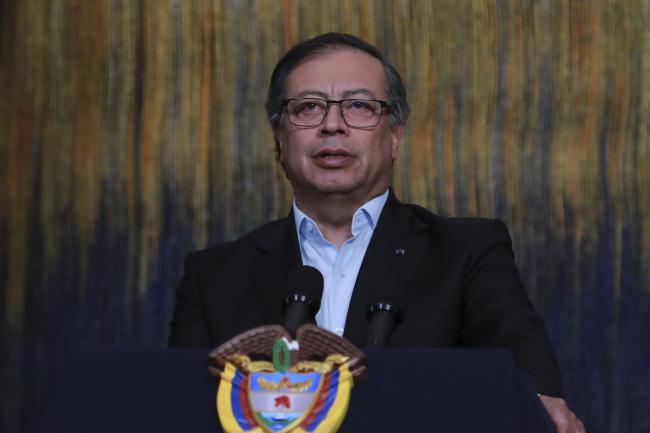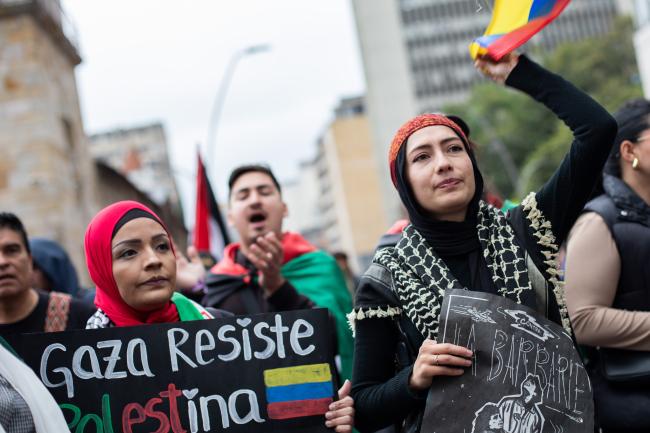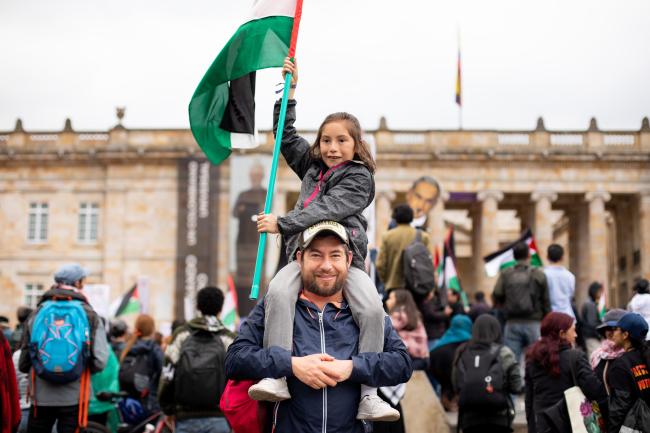
Leer este artículo en español.
In the immediate wake of Hamas’ deadly October 7 attack, many world leaders denounced Hamas’s assault on civilians as barbaric, made no mention of the occupation, and claimed Israel had the “right to defend itself'' with no strings attached. As the Israeli government has responded with forced displacement, calls for ethnic cleansing, and indiscriminate bombing that has taken the lives of nearly 9,000 Gazans, the vast majority women and children, it has become clear that the international community’s response to the initial attack was lacking.
One leader who did not follow the script was Colombian President Gustavo Petro, who immediately called for peace talks and the recognition of Palestinian statehood. While stopping short of condemning Hamas, Petro retweeted commentators lamenting the “terrible deaths of Israelis”' but warned of the dangers of a disproportionate Israeli response. In recent weeks, Petro has emerged as one of Israel’s most virulent critics.
A Colombian president using his podium to criticize the Israeli government represents a stark departure in a country with deep contemporary and historical ties to Israel. As the humanitarian situation has deteriorated in Gaza, other Latin American leaders have begun to denounce Israel’s response and call for a cease-fire: Bolivia severed diplomatic ties, and Chile and Colombia recalled their ambassadors for “consultations.” Protests, too, have sprung up across the region, from Chile, to Colombia, to Mexico. While the Israeli media and prominent Jewish groups have claimed that Palestine solidarity protests are rooted in anti-Semitism, a closer look at the history of Israeli interests and intervention in Latin America reveals a more complex picture.
Israel as Cold War Arms Supplier
The state of Israel itself may not have been founded without the support of Latin America. Excluding Western Europe and North America, no region was as supportive of the Zionist project in its beginnings as Latin America. The regional bloc delivered 13 out of the 33 total votes in favor of the partition plan of 1947 out of which, after a subsequent war, the state of Israel was born. All 18 Latin American governments represented in the United Nations also voted shortly after for Israel’s admission into the UN.
With few exceptions, this support continued throughout the 1950s and 60s, when the Latin American bloc in the UN was often even more supportive of Israel than Western governments. Things began to change with the rise of Third World Internationalism, the 1967 Arab-Israeli War, and the 1973 Yom Kippur War, in which Cuba provided troops to Syria. Against the backdrop of wars seen by many as acts of Israeli aggression, the rising importance of Arab oil, and an increasing distancing from the United States amid a global movement of non-alignment, Latin American governments’ early feelings about Zionism began to turn.
Central to the reconsideration of support for the Zionist project was Israel’s active role in perpetuating violence throughout the region in the 1970s and 1980s through arms sales, the direct training of military dictatorships, and the funding of violent counter-revolutionary movements. Often seen as merely a proxy for U.S. security interests in the region, Israel was there to step in with diplomatic and military backing when repressive regimes became too extreme for the United States to support.
This was the case with the Chilean dictatorship under General Augusto Pinochet. After the 1976 embargo on the selling of U.S. weapons to Chile, the Israeli government immediately became the largest weapons distributor to the Chilean regime. Israel also covertly armed and trained the Nicaraguan Contras in the early 1980s, partly at the behest of Washington, during their brutal war against the Sandinistas. Then Israeli defense minister Ariel Sharon visited Honduras in 1982 to meet directly with the Contras they were funding.
Similarly, Israel stepped in after the United States sanctioned Argentina’s brutal military dictatorship. From 1978-1983, the Israelis provided more than $1 billion in military equipment to an extremely anti-Semitic Argentine dictatorship that disproportionately targeted its Jewish citizens and tortured suspects in military jails decorated with images of Hitler. Argentine anti-Semitism was so blatant that scholars have posited that Israel allied with the regime because it represented an opportunity to recruit more Jews, fleeing violence at home, to the Israeli state.

Aside from the U.S. arms embargoes, central to the appeal of Israeli expertise was its ongoing settler-colonial control of Palestinians through a slate of policies and technologies that could be sold to eager authoritarian states. Nowhere was the export of the Israeli model as evident as in Guatemala, where right-wing leaders called explicitly for the “Palestinianization” of the Maya population. Key Guatemalan officials in charge of rural development flew to Israel and, returning impressed with the use of agricultural collectives (kibbutzim) as tools of surveillance, incorporated them in the scorched earth campaign pursued by General Efraín Rios Montt in 1982. Israeli officials were also on the ground in the countryside to help implement the reorganization of rural life in the name of fighting the guerrilla insurgency. In practice, the campaign terrorized villagers and sought “nothing less than ‘the definitive transformation of the face of the Indian highlands’” in the model of “a little Israel in the altiplano,” as George Black wrote for NACLA in 1983. “Armed village committees in Israeli settlements” provided the model for Guatemala's Civil Defense Patrols, while abundant Israeli-manufactured Uzi submachine guns contributed to the massacre of tens of thousands, most of them Maya.
Israel also supplied weapons to violent authoritarian regimes in El Salvador and Honduras, as well as countries on both sides of violent border wars like Ecuador and Peru. By the mid 1980s,18 Latin American countries had purchased Israeli weapons and the region represented a third of its entire arms trade.
Today, support for IsraeI persists despite its ongoing meddling in the region. Israeli provided military aid to the coup regime in Honduras in the wake of the U.S.-backed 2009 overthrow of democratically elected President Manuel Zelaya. More recently, it has continued to provide surveillance software like Pegasus for the governments of Mexico, El Salvador, and Dominican Republic to spy on journalists and human rights activists, sometimes with deadly consequences.
In recent years, Israel has also become a symbol of right-wing reaction. A rising Evangelical populist base across the continent proudly waves Israeli flags and demands that countries move their embassies to Jerusalem. As the story of Colombia reveals, the war on terror and the privatization of national security states have also provided the Israeli government with ample opportunity to continue profiting off of and contributing to the region’s insecurity.
Privatized Security States Join Forces
While official relations were established in the 1950s, Israeli collaboration with Colombian Armed Forces took off in the 1980s, when the latter began purchasing weapons from the former. At the time, the Colombian state was fighting a war against a plethora of armed leftist guerrilla insurgencies like the Revolutionary Armed Forces of Colombia (FARC). The Colombian government relied heavily on unofficial paramilitary forces to combat the insurgencies, mirroring the Israeli security strategy of using private military contractors to monitor subversive populations.
As the weapon sales kicked off, Israel also provided training to Colombian paramilitaries in Israel. Indeed, Carlos Castaño, the co-founder of Colombia’s most notorious paramilitary group, the United Self-Defense Forces of Colombia (AUC), received over a year of military training in Israel in the 1980s. He has even noted that the idea of self-defense units was “copied from the Israelis; every citizen of that country is a potential soldier.”
As the paramilitary organizations that would merge in the 1990s into the AUC began to grow, Israelis like Yair Klein, a former lieutenant-cum-mercenary who created the security firm Spearhead, were there to provide direct training and weapons. Fifty of the future AUC’s best students were sent to Israel for further training. The AUC, which between the late 1980s and early 2000s committed the majority of human rights violations in Colombia’s long-running and complex conflict, benefitted from a close relationship with the Colombian state.
Under two-term Colombian strongman Álvaro Uribe (2000-2008), the administration, like its paramilitary counterparts, maintained a tight relationship with both the Israeli government and the private military contractors and firms that, in the words of scholar and activist Les Field, form the “privatized parallel arm of the Israeli security state.” It was under Uribe’s rule that the similarities of the wars waged by the two countries became most obvious. Colombia honed a “radical right, counterrevolutionary, and anti-indigenous politics enacted by a state that also manifests as a privatized parastate,” according to Field. In doing so, Colombia’s “state-paramilitary-corporate-disenfranchisement” of Afrodescendant and Indigenous communities in Urabá and Chocó mirrored the Israeli state’s backing of private armed settlers who displace Palestinians from their land in the Jordan Valley.
The relationship has paid political dividends for Israel. In 2012, when 138 countries voted in the United Nations to recognize Palestine, Colombia abstained. In 2017, when 128 countries voted to condemn the United States’ recognition of Jerusalem as Israel’s capital, Colombia again abstained. Until outgoing President Juan Manuel Santos stealthily recognized Palestine on his way out in 2018, Colombia was the only South American country to not yet have done so.

“One Day they will Ask for our Forgiveness”
Even before Israel’s latest siege on Gaza, Gustavo Petro was vocal about Palestinian rights. In his most recent criticism, however, Petro has referenced Israeli aid to Colombian paramilitaries directly. While threatening to suspend diplomatic relations with Israel because “we don’t support genocide,” he tweeted that one day the Israeli government will “ask us for forgiveness for what their men did in our lands unleashing a genocide.” He directly referenced Yair Klein, who was sentenced in absentia to 10 years in prison in Colombian prison but has remained safely in Israel.
Petro’s rhetoric has been inflammatory: after Israel’s Defense Minister said that they were fighting “human animals,” he compared Israelis to Nazis. He has also denounced Israeli “terrorism,” and after being accused of being anti-Semitic, pushed back by saying he never supported Hitler “as did the oligarchy and the press that attacks me.” On October 31, Petro announced that he was calling a meeting with the Colombian ambassador in Israel. “If Israel doesn’t stop the massacre of the Palestinian people,” he tweeted, “we can’t remain there,” alluding to a potential suspension of diplomatic relations. Colombia also plans on opening a new embassy in Ramallah and has committed to sending aid to Gaza.
What has been missed in coverage of Petro’s response has been his repeated emphasis on the need for serious peace talks to achieve a two-state solution. Central to Petro’s denunciation of the West’s role in fueling the Israeli bombardment of Gaza is their double standard when it comes to the war in Ukraine. While Ukrainian resistance against Russia has been supported full stop—a resistance with significant neo-Nazi elements—support for Palestinian resistance against Israeli occupation has been deemed anti-Semitic. Petro has hammered home this contradiction in multiple speeches.
A former guerrilla fighter with the 19th of April Movement (M-19) who turned in his arms, Petro understands intimately the relationship between government oppression and political violence. Central to his political appeal was his plan for a “Total Peace” rooted in structural reforms and negotiations with Colombia’s main insurgencies. Petro has referenced these ongoing negotiations directly, tweeting “as the world heads to war, we head towards peace.”
In these negotiations, the Colombian government has recognized how its own actions have contributed to the inequalities, neglect, and violence that, though not justifications for terror, provide crucial context for the emergence of armed insurgency. Drawing on these experiences, Petro has argued that for peace to be a possibility, the Israeli occupation has to end. Colombian protestors, seeing in the demonization of Palestinian solidarity echoes of their own experiences being labelled FARC-sympathizers for defending campesinos from massacre, have argued the same in their frequent public protests denouncing Israeli violence.
Though imperfect and still incomplete, Colombia’s recent attempted peace processes hold valuable lessons that, together with Petro’s uncompromising stance in defense of Palestinian lives, the rest of the world desperately needs to heed.
Author’s note: If you’d like to support organizations doing great work on the ground in Gaza, here are a couple of suggestions: The Palestine’s Children’s Relief Fund; Medical Aid for Palestinians; ActionAid; and Anera.
Gabe Levine-Drizin is a PhD student in History at New York University focusing on Colombian agrarian reform and land occupations in the 1960s and 70s.
Katerine Lara Rojas is a journalist, photographer, and audiovisual producer based in Bogotá, Colombia. You can see more of her work on Instagram (@katlarojas) and her professional page.

